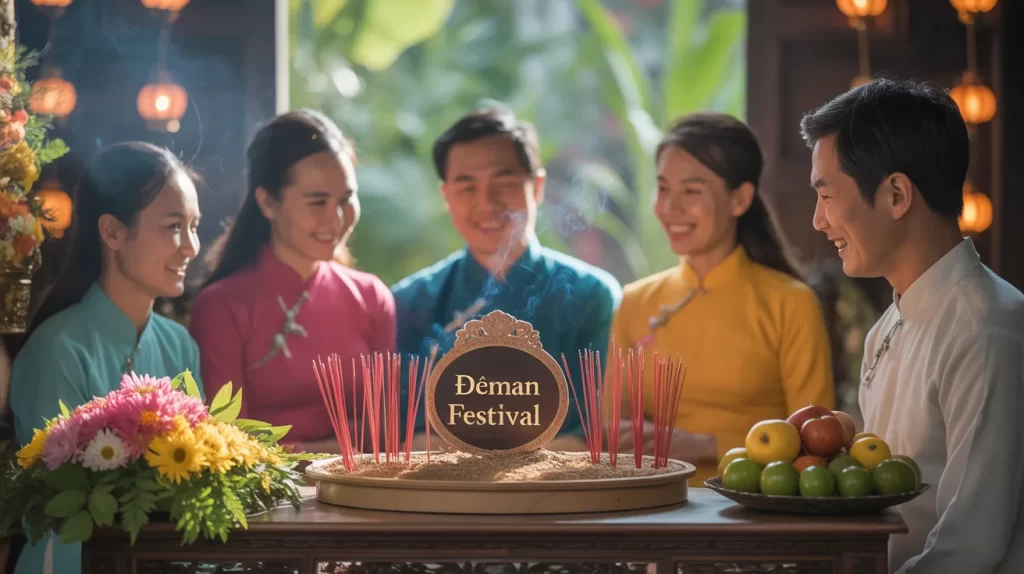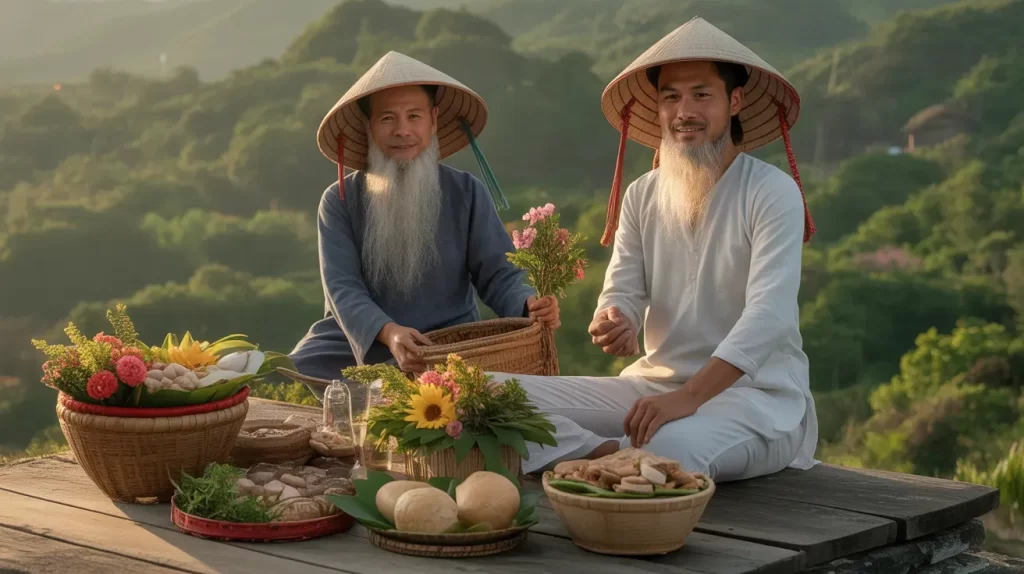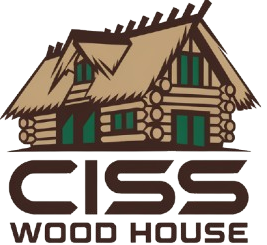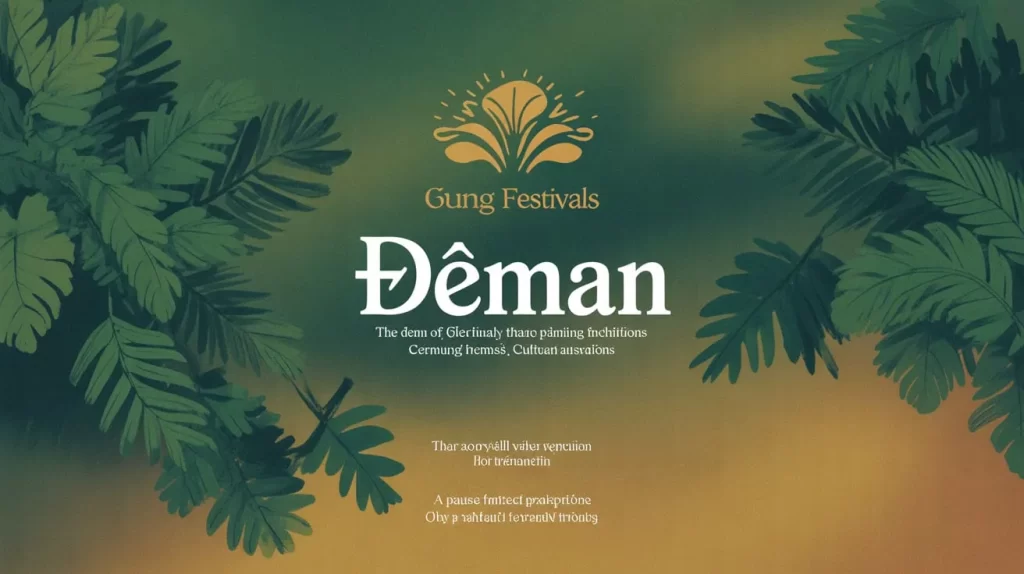Table of Contents
I still remember the first time I heard about Đeman. My Vietnamese friend described it as “the festival that brings families together,” and I was immediately curious.
What I discovered was far more beautiful than I expected – a celebration that connects generations, honors ancestors, and strengthens communities in ways that feel increasingly rare in our modern world.
Đeman isn’t just another festival on the calendar. It’s a sacred tradition that has shaped Vietnamese culture for centuries, and I want to share what I’ve learned about this remarkable celebration with you.
What is Đeman?

Đeman is a traditional Vietnamese festival that celebrates the end of the harvest season. I think of it as a time when communities pause to give thanks, remember their ancestors, and strengthen the bonds that hold families together.
During my research, I learned that Đeman combines three important elements:
- Spiritual worship of ancestral spirits
- A community gathering that brings people together
- Harvest celebration marking the end of the agricultural season
The festival typically takes place in rural Vietnamese communities, though I’ve discovered that Vietnamese families around the world now celebrate it to maintain their cultural connections.
The Deep Roots of Đeman

When I first started learning about Đeman, I was amazed by how deeply it’s rooted in Vietnamese history. This festival comes from ancient agricultural traditions that go back hundreds of years.
Historical Background
The origins of Đeman trace back to Vietnam’s agricultural society. Farming communities needed a way to mark the end of their harvest season, and they created this festival to serve multiple purposes:
- Thanking ancestors for protecting the crops
- Celebrating successful harvests with the community
- Preparing spiritually for the coming year
- Strengthening family bonds through shared traditions
I find it fascinating how Đeman evolved from a practical celebration into something much more meaningful – a spiritual and cultural cornerstone that defines Vietnamese identity.
Cultural Significance
What makes Đeman special isn’t just its age, but how it reflects core Vietnamese values. Through my exploration of this festival, I’ve come to understand that it represents:
- Respect for Ancestors: Vietnamese culture places enormous importance on honoring those who came before us. Đeman provides a dedicated time for families to connect with their ancestral spirits.
- Community Unity: In a world where people often feel isolated, Đeman creates space for genuine human connection. Neighbors become family, and families become stronger.
- Gratitude and Reflection: The festival encourages people to pause and appreciate what they have, rather than constantly striving for more.
Traditional Rituals and Ceremonies
The rituals of Đeman are what truly bring the festival to life. I’ve learned that each ceremony serves a specific purpose in connecting the living with the spiritual world.
Morning Prayers and Offerings
The day begins before sunrise with families gathering at ancestral altars. I’m struck by how peaceful and reverent these morning ceremonies are. Families prepare special foods, light incense, and offer prayers to their ancestors.
The typical offerings include:
- Fresh fruits representing the harvest
- Cooked rice symbolizes sustenance
- Flowers show respect and beauty
- Incense carrying prayers to the spiritual realm
Temple Ceremonies
Throughout the day, families visit local temples and shrines. I’ve observed that these aren’t just quick visits – they’re meaningful moments of connection. People light candles, burn incense, and spend time in quiet reflection.
The temple ceremonies serve several purposes:
- Collective worship that unites the community
- Spiritual cleansing for the coming year
- Seeking blessings for health and prosperity
- Maintaining traditions for future generations
Evening Celebrations
As the sun sets, Đeman transforms into a joyful community celebration. I love how the solemn morning rituals give way to music, dancing, and feasting. This balance between reverence and joy is what makes Đeman so special.
The evening activities include:
- Traditional music performed by local musicians
- Folk dances that tell stories of the harvest
- Community feasts featuring seasonal dishes
- Storytelling that passes down cultural knowledge
The Role of Food in Đeman
Food plays a central role in Đeman, and I’ve discovered that every dish has meaning. The festival brings families together through shared meals that connect them to their heritage.
Traditional Dishes
During Đeman, families prepare special foods that aren’t eaten at other times of the year. These dishes often use ingredients from the recent harvest, creating a direct connection between the celebration and the agricultural cycle.
Some traditional Đeman foods include:
- Sticky rice prepared with coconut and beans
- Seasonal vegetables from the harvest
- Special soups made with fresh herbs
- Traditional cakes shaped like harvest symbols
The Meaning Behind the Meals
What I find most beautiful about Đeman food is how it tells stories. Each dish represents something important:
- Abundance is shown through generous portions
- Gratitude expressed through careful preparation
- Family unity is created through shared cooking
- Cultural continuity is maintained through traditional recipes
Modern Celebrations of Đeman
While Đeman is rooted in ancient tradition, I’ve seen how it continues to evolve in modern times. Vietnamese communities around the world have adapted the festival to fit their new environments while maintaining its essential spirit.
Urban Adaptations
In cities, where temple access might be limited, families create home altars and organize community gatherings in cultural centers.
I admire how Vietnamese families have found ways to maintain their traditions despite geographic and social changes.
Read also: Why Does Territorial.io Run Bad on PC
Global Vietnamese Communities
Vietnamese immigrants have brought Đeman to countries around the world. I’ve learned that these celebrations often become even more meaningful for families living far from their homeland, as they provide a way to maintain cultural connections.
The Spiritual Dimension of Đeman
The spiritual aspect of Đeman is what sets it apart from other festivals. I’ve come to understand that this isn’t just about following traditions – it’s about maintaining a connection to something greater than ourselves.
Ancestor Worship
Vietnamese culture teaches that ancestors continue to watch over and guide their descendants. Đeman provides a special time for families to communicate with these spirits, seeking their wisdom and protection.
Community Spirituality
Beyond individual family worship, Đeman creates a sense of collective spirituality. I’ve observed how the festival brings together people of different ages and backgrounds, united in their shared reverence for tradition.
Why Đeman Matters Today?
In our fast-paced modern world, I believe Đeman offers something essential that many people are missing. The festival provides:
A Pause for Reflection
Đeman encourages people to step away from their daily routines and reflect on what truly matters. In a world of constant distractions, this pause feels increasingly valuable.
Genuine Human Connection
The festival creates opportunities for face-to-face interaction that go beyond surface-level socializing. Families share stories, neighbors help each other, and communities strengthen their bonds.
Cultural Preservation
For Vietnamese families, especially those living abroad, Đeman serves as a vital link to their cultural heritage. It ensures that traditions, values, and stories are passed down to future generations.
Planning Your Own Đeman Experience
If you’re interested in experiencing Đeman, I recommend starting with research and respectful observation. While this is a Vietnamese cultural tradition, many communities welcome respectful visitors who want to learn.
What to Expect
Đeman celebrations typically last for several days and include both public and private elements. The public ceremonies at temples and community centers are often open to visitors, while family gatherings remain private.
How to Participate Respectfully
If you’re invited to participate in Đeman, I suggest:
- Learning about the traditions beforehand
- Dressing appropriately for religious ceremonies
- Following the lead of your hosts
- Showing respect for the spiritual elements
- Asking questions when appropriate
Final Words
My journey into understanding Đeman has taught me that this festival represents something beautiful and timeless – the human need for connection, gratitude, and spiritual meaning.
In a world that often feels disconnected and hurried, Đeman offers a different way of being.
Whether you’re Vietnamese seeking to connect with your heritage or simply someone interested in learning about different cultures, Đeman has valuable lessons to offer.
It shows us that taking time to honor our ancestors, celebrate our communities, and express gratitude for life’s blessings isn’t just tradition – it’s essential to human flourishing.
I encourage you to learn more about Đeman and consider how its principles might enrich your own life.
After all, we all need traditions that connect us to something greater than ourselves, and Đeman offers a beautiful example of how to create those connections.






